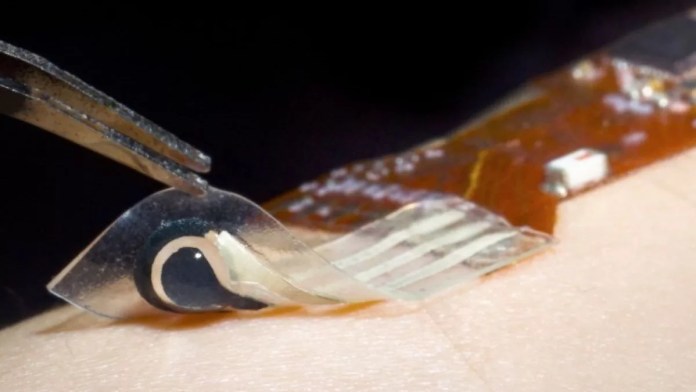
- Innovation provides a non-invasive, accurate, and comfortable method for tracking vital health indicators directly from the skin.
Researchers at the National University of Singapore (NUS) and the Agency for Science, Technology and Research (A*STAR), have developed a groundbreaking sensor capable of continuous and real-time detection of solid-state epidermal biomarkers (SEB).
The novel sensor presents a non-invasive method for monitoring vital health indicators directly from the skin, marking a significant advancement in the way we approach health diagnostics and management.
Biomarkers are biological molecules found in blood, urine, and other body fluids that provide vital information about physiological states and disease processes.
Traditional methods for biomarker detection often rely on invasive techniques, such as blood draws, or cumbersome procedures like urine analyses. These methods, while effective, can be inconvenient and uncomfortable for patients, presenting barriers to timely diagnosis and treatment.

Moreover, current sweat-based methods for biomarker detection face their own set of challenges, including the difficulty of inducing sweat in inactive individuals and the discomfort associated with the use of sweat-inducing drugs.
The introduction of SEBs, which includes critical health indicators such as cholesterol and lactate, represents a compelling alternative to traditional biomarker detection methods.
These biomarkers are located in the stratum corneum, the outermost layer of the skin, and have demonstrated strong correlations with various diseases, including cardiovascular disease and diabetes.
However, the direct detection of these biomarkers has been hindered by the limitations of existing technologies, particularly the inability of traditional solid electrodes to facilitate the necessary charge transport pathways for effective electrochemical sensing.
Innovative hydrogel-based sensor
The research team’s innovation—a wearable, stretchable, hydrogel-based sensor—overcomes these limitations by employing a bilayer hydrogel design that enhances both sensitivity and specificity in biomarker detection.
Assistant Professor Liu Yuxin from the NUS Institute for Health Innovation & Technology has highlighted the significance of this technology, which utilises an ionic conductive hydrogel (ICH) layer that solvates the biomarkers and an electronically conductive hydrogel (ECH) layer that facilitates electron transport.
“This unique bilayer structure enables the sequential solvation, diffusion, and electrochemical reaction of biomarkers, allowing for precise detection even in low concentrations.”
When the device is worn on the skin, SEBs dissolve into the ICH layer, diffuse through the hydrogel matrix, and undergo enzymatically catalysed electrochemical reactions at the junction between the ICH and ECH layers.
The data generated from these reactions is then transmitted wirelessly to an external user interface via a flexible printed circuit board, enabling continuous health monitoring without the need for invasive procedures. This innovative approach not only enhances the comfort of the user but also significantly improves the accuracy of health data collection.
Applications and implications
The implications of this technology are far-reaching. The ability to monitor biomarkers such as cholesterol and lactate in real time has profound applications in various fields, including chronic disease management, population-wide screening, remote patient monitoring, and sports physiology.
For individuals with chronic conditions that require constant health monitoring, such as diabetes or cardiovascular issues, this sensor provides a non-invasive solution that can facilitate early detection and timely intervention.
Furthermore, Dr Yang Le, Principal Scientist and Head of the Sensors and Flexible Electronics Department of A*STAR’s Institute of Materials Research and Engineering (A*STAR’s IMRE), said that the sensor’s ability to function on dry or non-sweaty skin expands its usability, making it accessible to a broader population, including those who may not have the opportunity or ability to engage in physical activities that induce sweat.
“The stretchable design enhances comfort and accuracy as well, by adapting to our skin’s natural elasticity and can change the way we approach health and lifestyle monitoring, particularly for those living with chronic conditions requiring constant health monitoring.”
In the realm of sports, monitoring athletes’ lactate levels is crucial for optimising performance and preventing exhaustion and tissue hypoxia. The continuous tracking of these metrics can lead to improved training regimens and better overall health outcomes for athletes.
“One of the possible applications of this technology is to replace the pregnancy diabetic test, commonly known as the glucose tolerance test. Rather than subject pregnant women to multiple blood draws, our sensor could be used to track real-time sugar levels conveniently in patients’ home, with a similar level of accuracy as traditional tests. This also can be applied to diabetes in general, replacing the need for regular finger-prick test,” Liu said.
Discover more from TechChannel News
Subscribe to get the latest posts sent to your email.



